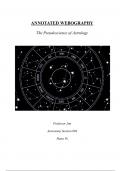Ast1002 - Study guides, Class notes & Summaries
Looking for the best study guides, study notes and summaries about Ast1002? On this page you'll find 29 study documents about Ast1002.
Page 2 out of 29 results
Sort by
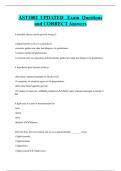
-
AST1002 UPDATED Exam Questions and CORRECT Answers
- Exam (elaborations) • 33 pages • 2024
-
- $8.99
- + learn more
A scientific theory can be proved wrong if: cultural beliefs evolve to contradict it. scientists gather new data that disprove its predictions. it cannot explain all phenomena. it is based only on conjecture.scientists gather new data that disprove its predictions. A hypothesis may become a theory: after many repeated attempts to falsify it fail. if a majority of scientists agree on its propositions. after it has been logically proved. if it makes at least one verifiable predictio...
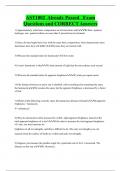
-
AST1002 Already Passed Exam Questions and CORRECT Answers
- Exam (elaborations) • 18 pages • 2024
-
- $8.49
- + learn more
1) Approximately, what basic composition are all stars born with?B) three -quarters hydrogen, one -quarter helium, no more than 2 percent heavier elements 2) Since all stars begin their lives with the same basic composition, what characteristic most determines how they will differ?D) mass they are formed with 3) What are the standard units for luminosity?A) watts 4) A star's luminosity is theE) total amount of light that the star radiates each second. 5) What are the standard units for ...
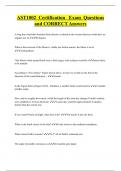
-
AST1002 Certification Exam Questions and CORRECT Answers
- Exam (elaborations) • 10 pages • 2024
-
- $8.49
- + learn more
A long thin cloud that stretched from directly overhead to the western horizon would have an angular size of 90 degrees When a thin crescent of the Moon is visible just before sunrise, the Moon is in its waning phase f the Moon's orbit around Earth were a little larger, solar eclipses would be more likely to be annular According to "The Zodiac" Figure shown above, in June we would see the Sun in the direction of the constellation(s)... Gemini In the Figure below (Figure 0.20A - Pa...
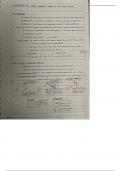
-
Astronomy (AST1002) Chapter 13-15, 23-24 Class Notes
- Class notes • 12 pages • 2024
- Available in package deal
-
- $9.37
- + learn more
Astronomy (AST1002) Chapter 13-15, 23-24 Class Notes at Santa Fe College
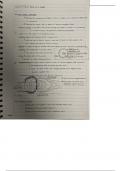
-
Astronomy (AST1002) Chapter 8-12 Class Notes
- Class notes • 13 pages • 2024
- Available in package deal
-
- $9.37
- + learn more
Astronomy (AST1002) Chapter 8-12 Class Notes at Santa Fe College
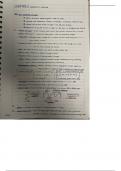
-
Astronomy (AST1002) Chapter 5-7 Class Notes
- Class notes • 11 pages • 2024
- Available in package deal
-
- $9.37
- + learn more
Astronomy (AST1002) Chapter 5-7 Class Notes at Santa Fe College
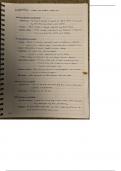
-
Astronomy (AST1002) Chapter 1-4 Class Notes
- Class notes • 11 pages • 2024
- Available in package deal
-
- $9.37
- + learn more
Astronomy (AST1002) Chapter 1-4 Class Notes at Santa Fe College
Introduction to Astronomy (AST1002) Finals Anotated Webography on the Pseudoscience of Astrology,
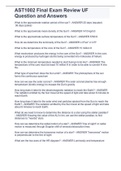
-
AST1002 Final Exam Review UF Question and Answers
- Exam (elaborations) • 14 pages • 2022
-
- $9.99
- + learn more
What is the approximate rotation period of the sun? - ANSWER 25 days (equator) 36 days (poles) What is the approximate mean density of the Sun? - ANSWER 1410 kg/m3 What is the approximate surface temperature of the Sun? - ANSWER 5780 K How do we determine the luminosity of the Sun? - ANSWER L=Flux* 4 π R² What is the temperature of the core of the Sun? - ANSWER 15 million K What mechanism produces the energy in the core of the Sun? - ANSWER In the core, energy is produced by h...
Astronomy (AST1002) Full Course Class Notes at Santa Fe College

That summary you just bought made someone very happy. Also get paid weekly? Sell your study resources on Stuvia! Discover all about earning on Stuvia



